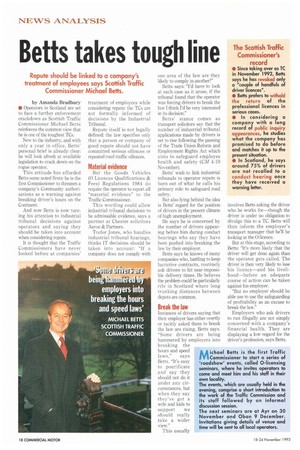Betts takes tough line
Page 20

If you've noticed an error in this article please click here to report it so we can fix it.
Repute should be linked to a company's treatment of employees says Scottish Traffic Commissioner Michael Betts.
by Amanda Bradbury • Operators in Scotland are set to face a further enforcement crackdown as Scottish Traffic Commissioner Michael Betts reinforces the common view that he is one of the toughest TCs.
New to the industry, and with only a year in office, Betts' personal brief is already clear: he will look afresh at available legislation to crack down on the rogue operator.
This attitude has afforded Betts some noted firsts; he is the first Cornmissioner to threaten a company's Community authorisations as a warning against breaking driver's hours on the Continent.
And now Betts is now turning his attention to industrial tribunal decisions against operators and saying they should be taken into account when considering repute.
It is thought that the Traffic Commissioners have never looked before at companies' treatment of employees while considering repute: the TCs are not formally informed of decisions by the Industrial Tribunal.
Repute itself is not legally defined: the law specifies only that a person or company of good repute should not have committed serious offences or repeated road traffic offences.
Material evidence
But the Goods Vehicles (0 Licences Qualifications & Fees) Regulations 1984 do require the operator to report all material evidence" to the Traffic Commissioner.
This wording could allow industrial tribunal decisions to be admissable evidence, says a partner at Chester solicitors Aaron & Partners.
Trefor Jones, who handles industrial tribunal hearings, thinks IT decisions should be taken into account: "If a company does not comply with one area of the law are they likely to comply in another?"
Betts says: "I'd have to look at each case as it arose, if the tribunal found that the operator was forcing drivers to break the law 1. think I'd be very interested in its decision."
Betts' stance comes as transport solicitors say that the number of industrial tribunal applications made by drivers is set to rise following the passing of the Trade Union Reform and Employment Rights Act which aims to safeguard employee health and safety (CM 4-10 November).
Betts' wish to link industrial tribunals to operator repute is born out of what he calls his primary role: to safeguard road safety.
But also lying behind the idea is Betts' regard for the position of drivers in the present climate of high unemployment.
He says he is concerned by the number of drivers appearing before him during conduct hearings who say they have been pushed into breaking the law by their employer.
Betts says he knows of many companies who, battling to keep lucrative contracts, routinely ask drivers to hit near-impossible delivery times. He believes the problem could be particularly rife in Scotland where long trunking distances between depots are common.
Break the law
This usually involves Betts asking the driver who he works for—though the driver is under no obligation to divulge this to a TC. Betts will then inform the employer's transport manager that he'll be looking at the 0-licence.
But at this stage, according to Betts: "It's more likely that the driver will get done again than the operator gets called. The driver is then very likely to lose his licence—and his livelihood—before an adequate course of action can be taken against his employer.
"But no employer should be able use to use the safeguarding of profitability as an excuse to break the law."
Employers who ask drivers to run illegally are not simply concerned with a company's financial health. They are displaying a low regard for the driver's profession, says Betts.




















































































































